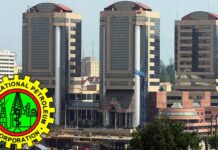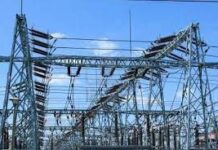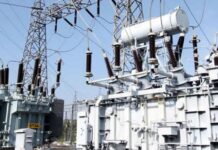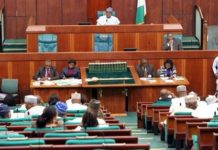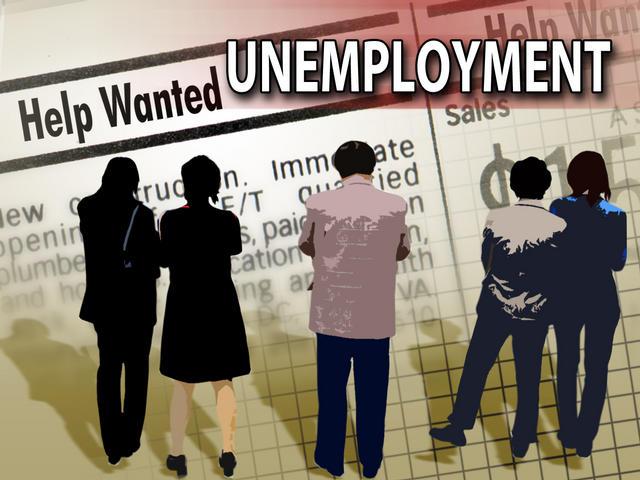
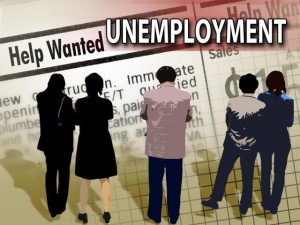 Following global economic headwinds and drop in oil prices, which formed the major economic foundation for Nigeria, the number of Nigerians that are either unemployed, sacked or underemployed has continued to rise on a monthly basis resulting in societal challenges and security threats to the nation.
Following global economic headwinds and drop in oil prices, which formed the major economic foundation for Nigeria, the number of Nigerians that are either unemployed, sacked or underemployed has continued to rise on a monthly basis resulting in societal challenges and security threats to the nation.According to National Bureau of Statistics (NBS), unemployment rate in Nigeria stood at 21.40 per cent. Many Nigerians are underemployed particularly in the informal sector of the economy with no job security and opportunity for career
progression for majority of the employees.
progression for majority of the employees.
For instance, Economic Confidential discovered the few available vacancies are now filled through contract appointments. Most players in telecoms, security, construction and manufacturing industries recruit staffs through contract jobs which have resulted in the proliferation of recruitment companies across the land.
The last administration had claimed to have provided about 1.2 million jobs in the first quarter of 2015, only for the NBS to reverse the figure after its assessment to indicate that 469,070 jobs were created in the economy during the first quarter and that the informal sector yielded 332,403 new jobs as the most active.
In that quarter, the formal sector only created about 130,941 new jobs, representing about 27.92% of total jobs created. The public sector also added about 1,339 (about 30.5%) jobs, making a total of 5,726 new jobs, or 1.2% of the total jobs created during the period.
The last administration had claimed to have provided about 1.2 million jobs in the first quarter of 2015, only for the NBS to reverse the figure after its assessment to indicate that 469,070 jobs were created in the economy during the first quarter and that the informal sector yielded 332,403 new jobs as the most active.
In that quarter, the formal sector only created about 130,941 new jobs, representing about 27.92% of total jobs created. The public sector also added about 1,339 (about 30.5%) jobs, making a total of 5,726 new jobs, or 1.2% of the total jobs created during the period.
Public affair analysts have continued to query the reason for the inflation of employment figure by the last government before the general elections only for the NBS to provide evidence on the claim. The last administration had also claimed to have generated over 10, 000 jobs under its Youth Enterprise with Innovation in Nigeria (YOUWIN) programme in three years.
The new World Bank study released in Abuja in March 2016 had recommended the need for Nigeria to create an estimated 40 to 50 million additional jobs between 2010 and 2030 to avert a nationwide market crisis which may result in economic crisis. The reports indicated that majority of adult Nigerians are employed, but locked into low productivity and low income work, with no job or income security.
It said “to reduce poverty and promote inclusive growth, the jobs to be created need to be more productive and provide higher incomes than the country’s jobs provides today.” It further noted that beyond basic skills, better policies and programmes would improve access and market relevance of technical vocational education and training.
The Country Director of World Bank in Nigeria Rachid Benmessaoud, said: “Understanding where people work, constraints to firm growth, and the skills needed is fundamental for formulating appropriate policies, and the detailed diagnostics in these reports are criticalinputs to developing education and job strategies for Nigeria.”
It found that half of working Nigerians are smallholder farmers and another 30 per cent of them self-employed in small or micro-household enterprises in the non-agricultural sector, whose work is not enough to escape poverty, or attain middle class status for their households.
The new World Bank study released in Abuja in March 2016 had recommended the need for Nigeria to create an estimated 40 to 50 million additional jobs between 2010 and 2030 to avert a nationwide market crisis which may result in economic crisis. The reports indicated that majority of adult Nigerians are employed, but locked into low productivity and low income work, with no job or income security.
It said “to reduce poverty and promote inclusive growth, the jobs to be created need to be more productive and provide higher incomes than the country’s jobs provides today.” It further noted that beyond basic skills, better policies and programmes would improve access and market relevance of technical vocational education and training.
The Country Director of World Bank in Nigeria Rachid Benmessaoud, said: “Understanding where people work, constraints to firm growth, and the skills needed is fundamental for formulating appropriate policies, and the detailed diagnostics in these reports are criticalinputs to developing education and job strategies for Nigeria.”
It found that half of working Nigerians are smallholder farmers and another 30 per cent of them self-employed in small or micro-household enterprises in the non-agricultural sector, whose work is not enough to escape poverty, or attain middle class status for their households.
The World Bank statistics added that the bad economic situation is worsened by the fact that some 30 per cent of Nigerian youth have not completed more than primary education.
President Muhammadu Buhari at his inauguration last year had said: “Unemployment, notably youth un-employment features strongly in our Party’s Manifesto. We intend to attack the problem frontally through revival of agriculture, solid minerals mining as well as credits to small and medium size businesses to kick-start these enterprises. We shall quickly examine the best way to revive major industries and accelerate the revival and development of our railways, roads and
general infrastructure.” (sic).
President Muhammadu Buhari at his inauguration last year had said: “Unemployment, notably youth un-employment features strongly in our Party’s Manifesto. We intend to attack the problem frontally through revival of agriculture, solid minerals mining as well as credits to small and medium size businesses to kick-start these enterprises. We shall quickly examine the best way to revive major industries and accelerate the revival and development of our railways, roads and
general infrastructure.” (sic).
Vice President Yemi Osinbajo had also promised that the Buhari government would create over three million jobs in the next three years. He said the Presidency and the National Economic Summit Group (NESG) have jointly strategized on job creation and youth empowerment framework and implementation in Nigeria.
He said: “Three million jobs would be created in the country within three years starting in 2016 especially in Technology, Wholesale and Retail, Construction and Agro-allied sectors of the Nigerian economy. In 2016 alone, over 700, 000 private sector jobs will be createdmostly in the Agro-allied sector. The direct government jobs planned by the Buhari presidency include the 500, 000 teaching jobs for
unemployed graduates. We are not unaware that this process of job creation is slow but President the government is addressing the constraints of regulatory and institutional delays in the business sector.”
unemployed graduates. We are not unaware that this process of job creation is slow but President the government is addressing the constraints of regulatory and institutional delays in the business sector.”
However, the National Bureau of Statistics’ Third Quarter Report on unemployment and underemployment had noted that at least 1.5 million Nigerians had become unemployed since President Buhari took office. The government also promised to recruit 10, 000 police officers to join the Nigerian Police in combatting crimes and improving the security situation in the country.
Economic analysts have noted that no significant recruitment has been carried by out by the All Progressives Congress (APC)-led administration in over 10 months in office apart from political appointments.
Many firms had engaged in mass sack of workers and others have reduced their salaries resulting in increase in poverty level among Nigerians. The dwindling economy has escalated insecurity and criminal activities among youth. The power supply in the system has also failed to improve despite the new tariff regime that the Distribution Companiesintroduced in February 2016 which was not reverse despite outcry by many Nigerians. Yet, more than half of Nigerian households are yet to be
metered.
Analysts have tasked government to fast-track its employment processes because the dwindling economy has resulted to more unemployment, underemployment, job/income insecurity and sacking by many informal sector, particularly those dealing with imported goods and commodity market.
metered.
Analysts have tasked government to fast-track its employment processes because the dwindling economy has resulted to more unemployment, underemployment, job/income insecurity and sacking by many informal sector, particularly those dealing with imported goods and commodity market.
Economic confidential learnt that the resultant effect of the economic downturn in the country has made many firms, particularly oil and gas, banking sector, universities, telecoms, manufacturing, media and publishing, and construction companies to engaged in mass sack of thousands of Nigerians recently.
Some of the instances include the sacking of 50 top officials of Eco Bank, 150 workers by FCMB and over 700 oil workers between September 2015 and February, this year.
Also, reports from various contractors indicated that about 37,000 workers were laid off during this regime because of non-payment of contractual obligations. And there are indications that more workers will still be sacked because of the inability of Federal Government to reconcile with several companies’ already handling constructions jobs for government.
Many states of the federation are unable to pay salaries of their workers despite the bailout funds released by the government. The test-run of the sacking that would have shaken the nation’s economy to its foundation was reverted in Imo State with the intervention of theOrganised Labour.
Governor Rochas Okorocha in mid-January sacked over 3,000 workers in 19 parastatal agencies and departments. He recalled the workers over the threat from Organised Labour to shut down Imo state.
Going by NBS Consumer Prices Index (CPI)/Inflation report, the country’s inflation rose by 11.4 per cent in February compared to the 9.6 per cent in January, indicating measurement of average change in prices of goods and services consumed by people on daily basis. There is a significant increase in inflation rate in February.
It said: “The headline index increased by 11.4 per cent year-on-year in February, roughly 1.76 per cent point higher from rates recorded in January (9.6%). The faster pace of increases which led to the overall rise in the headline index was recorded across almost all major divisions. This contributes to the headline index with the exception of the restaurants and hotels division which increased, albeit at a slower pace.’’
The impact of inflation has affected commodity market, imported goods and other consumables to a large extent. Even average Nigerians pay as high as 20 per cent on food and beverages.
It said: “The headline index increased by 11.4 per cent year-on-year in February, roughly 1.76 per cent point higher from rates recorded in January (9.6%). The faster pace of increases which led to the overall rise in the headline index was recorded across almost all major divisions. This contributes to the headline index with the exception of the restaurants and hotels division which increased, albeit at a slower pace.’’
The impact of inflation has affected commodity market, imported goods and other consumables to a large extent. Even average Nigerians pay as high as 20 per cent on food and beverages.
For instance, Economic Confidential learnt that the price of Indomie Noodles has increased by over 20 per cent, while prices of rice, flour, wheat and other commodities are also high in the market, including bottled and sachet water.
Continuous sacking of workers in recent times has resulted in increased insecurity for the nation which has negative implications on foreign direct investment interests from other nations. For instance, the spate of kidnappings, armed robberies, herdsmen/farmers’ clashes, cattle rustling has continued to increase on a daily basis.
Continuous sacking of workers in recent times has resulted in increased insecurity for the nation which has negative implications on foreign direct investment interests from other nations. For instance, the spate of kidnappings, armed robberies, herdsmen/farmers’ clashes, cattle rustling has continued to increase on a daily basis.
The Agatu herdsmen/farmers’ case, the recent kidnapping of school children in Lagos, increased armed robbery attacks and insecurity in the North-east are traceable to unemployment and underemployment challenges facing the nation.
The question is, how is the current administration going to handle its job creation initiative without turning it to political affairs?
Analysts’ note that many civil service jobs are gotten through politicians and those that have no political godfather may not be able to secure Federal or State Civil Service employment. The government initiative to use entrepreneurship to create job for many youth is a welcome development, only that merit should be adopted in selectingbeneficiaries.
Economy observers have identified the way out of this current economic downturn as quick and proper implementation of the 2016 budget which gave about 30 per cent to capital expenditure.
Former Lagos State Commissioner for Finance, Ayo Gbeleyi, in a chat on Channels Television’s Sunrise Daily programme last month had said the 2016 budget would massively contribute to the nation’s economy if properly implemented.
He said effective utilisation and implementation of capital expenditure in the budget framework would make government spend massively on infrastructure that is the best process to create employment opportunities for Nigerians and reduce poverty in the nation.


